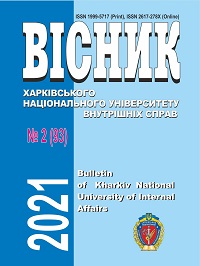Importance of Public Interests in Patent Law
Abstract
The article is focused on studying and explaining the legal nature and content of public interests from point of view оf the patent protection system in the context of globalization processes. The problems of the influence of patent rights on the possibility of individuals to realize their rights in the health care sector are identified. The concepts of private and public interests, their ratio, content featurs in patent law are analyzed. The defining value of interest is fixed at the normative level in civil law, where intellectual property law is its sub-branch. In general, private interest can be both property and non-property. In this context, the provisions of national and international legislation of the necessity оf balance the interests of society and patent holders are analyzed; on restricting the rights of patent owners with the aim to ensure the public interest; about necessity in certain cases to break the monopoly of patent owners through compulsory licensing, etc. The tendency to strengthen the protection of public interests has been revealed. Attention is paid to the issue of distinguishing between the private interests of patent holders and the interests of society. It is clarified why these interests collide and what rules justify such conflicts. The conclusion that necessity to ensure a balance between private and public interests is substantiated as the urgent task of modern legislation in the legal regulation of patent relations.
One of the legal ways to achieve a balance between the interests of society and patent holders is a compulsory license. The institution of compulsory licensing fully corresponds to the peculiarities of patent legal relations and does not deprive the patent owner of the protection of his exclusive right. But it does not prevent the latter to independently use and effectively commercialize the relevant technical solution. Compulsory license is possible to apply precisely in those cases when the harm to the public interest from the exercise of the exclusive patent right exceeds the benefits received by the right holder.
The authors have determined the direction of the development of legal regulation of patent relations in this area taking into account the requirements of international treaties.
Downloads
References
Vorozhevich A.S., 2017. Risks and possible consequences of restrictions on patent rights in the pharmaceutical industry [Riski i vozmozhnye posledstviya ogranichenii patentnykh prav v farmsfere]. Vestnik Universiteta imeni O. E. Kutafina – Courier of the Kutafin Moscow State Law University, No. 6, pp. 42-53.
Vorozhevich A.S., 2015. Compulsory licensing terms: international and national aspect [Usloviya prinuditel`nogo litsenzirovaniya: mezhdunarodnyi i natsional`nyi aspekt]. Vestnik Arbitražnogo suda Moskovskogo okruga – Moscow District Commercial Court Bulletin, No. 2, pp. 14-30.
Sitdikova R.I., 2013. Civil law mechanism for the protection of private, public and public interests by copyright [Grazhdansko-pravovoi mekhanizm okhrany chastnykh, obshchestvennykh i publichnykh interesov avtorskim pravom]. Abstract of D.Sc. dissertation. Kazan Federal University.
Gribanov V.P., 1967. Interest in civil law [Interes v grazhdanskom prave]. Sovetskoe gosudarstvo i pravo, No. 1, pp. 167-182.
Ghanotakis E., 2004. Access to Medicines for Developing Countries. Journal of Word IP, Vol. 7, Iss. 14, pp. 167-182.
Shchedrina N.D., 2018. Taking into account public interests in compulsory licensing of objects of patent rights [Uchet publichnykh interesov v prinuditel`nom litsenzirovanii ob``ektov patentnykh prav]. Severo-Kavkazskij ûridičeskij vestnik – North Caucasus Legal Vestnik, No. 2, pp. 71-75.
Shyamkrishna B., 2010. The Pragmatic Incrementalism of Common Law Intellectual Property. Vanderbilt Law Review, [online] Vol. 63. Available at https://ssrn.com/abstract=1572847 [Accessed 23 April 2021].
Tyler N.S., 2014. Patent nonuse and technology suppression: the use of compulsory licensing to promote progress. University of Pennsylvania Law Review, Vol. 161, pp. 451-475.
Copyright (c) 2021 O. V. Pikhurets, A. O. Pikhurets

This work is licensed under a Creative Commons Attribution 4.0 International License.




